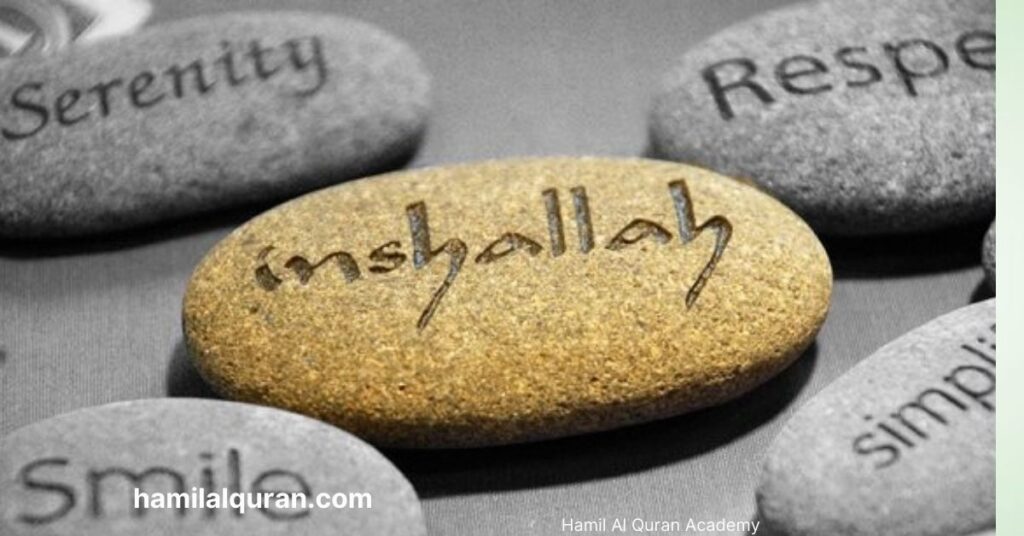Inshallah, meaning ‘if Allah wills’ in Arabic, holds significant cultural and religious importance within the Islamic faith. Its linguistic origins date back to the Quran and have since become deeply embedded in everyday language among Muslims worldwide.
Understanding the context and usage of Inshallah is crucial for appreciating its nuances. This article explores the multifaceted meaning of Inshallah, delving into its cultural significance, translation, and practical application. It examines how Inshallah is integrated into prayers and worship, serving as a reminder of humility and surrender to God’s divine plan. Additionally, it discusses how Inshallah influences future plans and goal setting while providing comfort and hope.
The article also addresses misconceptions surrounding Inshallah, aiming to dispel stereotypes often associated with it. By embracing the true meaning and power of Inshallah in daily life, individuals can gain a deeper understanding of Islamic culture while fostering a sense of connection with others who use this term regularly.
Cultural Significance of Inshallah in Islamic Faith
You may be surprised to learn that inshallah carries deep cultural significance within the Islamic faith. Inshallah, meaning ‘if Allah wills,’ is more than just a phrase; it is a reflection of the belief that everything happens by the will of Allah.
This concept is deeply ingrained in Islamic culture and influences various aspects of daily life, including cultural rituals and interfaith dialogue.
Inshallah plays a crucial role in cultural rituals, such as weddings and religious festivals. It serves as a reminder that all events are subject to Allah’s decree and that humans should submit themselves to His will. Whether it is expressing hopes for a successful marriage or seeking blessings during Eid celebrations, inshallah provides comfort and reassurance.
Furthermore, in interfaith dialogue, Muslims often use inshallah as a way to express humility and respect for other religions. By acknowledging that all outcomes are ultimately determined by Allah, they emphasize their belief in divine providence while fostering understanding between different faith communities.
Overall, the use of inshallah reflects the deep spiritual connection between Muslims and their Creator while also promoting harmony and unity among diverse cultures and beliefs.

Linguistic Origins and Translation of Inshallah
Linguistic scholars have traced the origins of the term ‘inshallah’ and explored its translation into various languages. The etymology of ‘inshallah’ can be traced back to the Arabic language, where it is composed of three words: ‘in,’ which means ‘if,’ ‘sha,’ which means ‘will,’ and ‘Allah,’ which means ‘God.’ This phrase is commonly used by Muslims as a way to express their reliance on God’s will and acknowledge that everything happens according to His plan.
Interestingly, variations of ‘inshallah’ exist in different languages, each with its own unique translation. In Persian, it is translated as ‘InshaAllah’ or ‘Khoda Hafez’ meaning “God willing” or “May God protect you.” In Turkish, it becomes ‘İnşallah’ and in Urdu/Hindi, it is expressed as “Agar Allah Chahe” or “Agar Khuda Chahe,” both translating to “If Allah/God wills.”
These linguistic variations highlight the cultural diversity within Islamic communities worldwide while reinforcing the shared belief in surrendering to God’s divine plan.
Everyday Usage and Context of Inshallah
Everyday life is filled with moments where you express your reliance on God’s will, whether it’s waiting for a job offer or hoping for good weather during a picnic. Inshallah, meaning ‘if God wills,’ is a phrase commonly used in the Muslim world to acknowledge this dependence and surrender to divine power.
It is not only an expression of faith but also carries cultural significance in shaping interpersonal relationships and social interactions. When someone says inshallah, it signifies their acceptance that outcomes are ultimately determined by God’s plan and serves as a reminder to be humble and patient. Its usage reflects a deep-rooted belief that everything happens according to God’s decree, and it encourages individuals to approach life with trust and acceptance of whatever may come their way.
Inshallah Meaning in Prayers and Worship
Picture the profound impact of incorporating ‘inshallah’ into your prayers and worship. This Arabic phrase, meaning ‘if God wills,’ carries a significant weight in personal relationships and during times of uncertainty and adversity.
By including ‘inshallah’ in your prayers, you acknowledge that ultimately, it’s God’s will that prevails. It serves as a reminder of our limited control over circumstances and fosters a sense of surrender to a higher power.
In personal relationships, incorporating ‘inshallah’ expresses humility and openness to whatever outcome God deems fit. It helps cultivate patience by acknowledging that things may not always go according to our plans or desires.
During challenging times, uttering ‘inshallah’ provides solace and reassurance that everything will unfold as intended by the Divine. It offers comfort in knowing that there is a greater purpose behind every hardship we face.
Therefore, embracing ‘inshallah’ in prayers and worship enriches one’s spiritual journey by deepening their connection with God and fostering trust in His divine wisdom.

Inshallah Meaning as a Reminder of Humility and Surrender
Imagine how incorporating ‘inshallah’ into your prayers and worship can serve as a constant reminder to humbly surrender yourself to the divine will. By uttering this simple phrase, you acknowledge that your plans and desires are subject to the higher power’s guidance and approval.
Here are four ways in which ‘inshallah’ can impact your relationships and decision-making:
- In relationships: Including ‘inshallah’ in your conversations reminds you to be patient and understanding with others. It encourages empathy, as you recognize that any outcome is ultimately up to God’s will.
- In decision making: Adding ‘inshallah’ when discussing future plans helps instill a sense of humility and acceptance of uncertainty. It prompts you to seek guidance from a higher authority before making important choices.
- Trust-building: By using ‘inshallah,’ you demonstrate trust in divine wisdom, fostering trust between yourself and others who share the same belief system.
- Resilience: Embracing ‘inshallah’ allows you to navigate life’s challenges with grace, knowing that everything happens for a reason beyond our understanding.
Incorporating ‘inshallah’ into your prayers and worship can profoundly impact both your personal growth and interactions with others, reminding you of the importance of humility, surrender, and trust in every aspect of life.
Inshallah Meaning in Future Plans and Goal Setting
When making future plans and setting goals, incorporating ‘inshallah’ can help us embrace the uncertainty and surrender to the divine guidance that ultimately shapes our paths.
Inshallah, meaning ‘if Allah wills,’ reminds us that while we can make plans and work towards our goals, ultimately it is up to a higher power to determine the outcome. This notion of surrendering control can be particularly valuable in decision-making processes, as it encourages humility and acceptance of whatever may come.
Additionally, in personal relationships, incorporating ‘inshallah’ can foster a sense of trust and understanding. By acknowledging that the course of events is not solely determined by our own actions, but also by a greater force, we are able to approach relationships with patience and open-mindedness.
In this way, ‘inshallah’ serves as a reminder to appreciate the journey rather than solely focusing on the end result.
Inshallah Meaning as a Source of Comfort and Hope
Incorporating ‘inshallah’ into our mindset brings a comforting sense of surrender and hope, reminding us that our paths are ultimately guided by a higher power.
This phrase, meaning ‘if Allah wills it,’ is commonly used in various cultures as a form of expression. It reflects the belief in divine will and fate, acknowledging that we can make plans and set goals, but ultimately the outcome is out of our control.
Inshallah allows us to find solace in knowing that whatever happens is what was meant to be. It encourages us to accept life’s uncertainties with grace and trust in the greater plan.
By embracing this concept, we can alleviate stress and anxiety, finding peace in the knowledge that everything happens for a reason.
Misconceptions and Stereotypes Surrounding Inshallah
Don’t fall into the trap of believing the misconceptions and stereotypes surrounding ‘inshallah’ – it’s time to debunk these false assumptions. Contrary to popular belief, ‘inshallah’ doesn’t imply laziness or a lack of commitment. It’s often misunderstood as a way of avoiding responsibility or making empty promises. However, in its true essence, ‘inshallah’ carries deeper connotations that reflect an individual’s reliance on God’s will and acceptance of fate.
The phrase is deeply rooted in Islamic culture and holds great significance for those who use it sincerely. In popular culture, ‘inshallah’ has been misrepresented as a flippant response to avoid making concrete plans or fulfilling commitments. This portrayal fails to capture the true meaning behind the phrase and perpetuates stereotypes about Muslims being unreliable or untrustworthy.
It’s important to recognize that ‘inshallah’ isn’t an excuse for negligence but rather a humble acknowledgment that outcomes are ultimately in God’s hands. By understanding this nuance, we can move beyond the misconceptions surrounding ‘inshallah’ and appreciate its genuine intention within the Islamic faith and practice.

Embracing the Power and Meaning of Inshallah in Daily Life
Discover the transformative power of embracing ‘inshallah’ in your daily life and allow it to guide you on a journey of faith and surrender.
Inshallah, meaning ‘if Allah wills’, holds significant importance in decision-making, relationships, and communication. By incorporating this phrase into your daily vocabulary, you acknowledge that ultimately, all outcomes are in the hands of a higher power.
When faced with difficult decisions or uncertain situations, saying ‘inshallah’ can provide solace and remind you to trust in divine guidance. Moreover, using ‘inshallah’ in relationships and communication fosters humility and respect for others’ plans and desires. It allows for open-mindedness and acceptance of differing perspectives.
Embracing the meaning of ‘inshallah’ empowers individuals to approach their lives with an attitude of surrender while recognizing that their efforts are only part of a larger plan orchestrated by Allah.
If you need to learn more about Islam enroll in our online Islamic Studies course free trial Now!
Conclusion
The term ‘inshallah’ holds great cultural and religious significance in the Islamic faith. Its linguistic origins and translation highlight its connection to surrendering to God’s will. Everyday usage of ‘inshallah’ reflects a sense of humility and hope, while its presence in prayers and worship emphasizes the belief in divine guidance.
It is important to debunk misconceptions and stereotypes surrounding this term, as embracing its meaning can bring comfort and serve as a reminder of our reliance on a higher power. Incorporating ‘inshallah’ into our daily lives can foster a deeper understanding of faith and spirituality.
